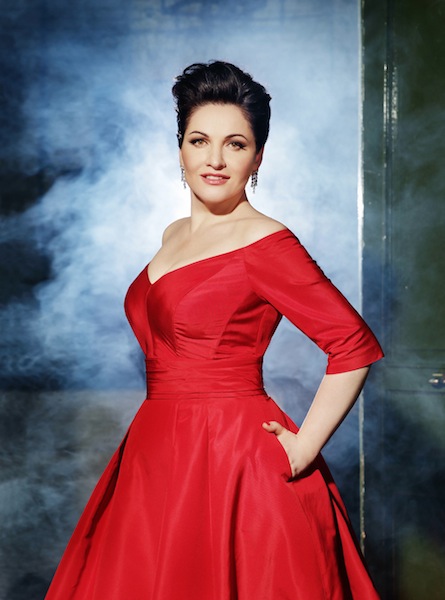Soprano Gerzmava sparks Moscow Virtuosi concert

Soprano Hibla Gerzmava performed with conductor Vladimir Spivakov and the Moscow Virtuosi Friday night at the Cutler Theatre.
In 1979, conductor and violinist Vladimir Spivakov founded his own ensemble in the face of the cultural stagnation that marked the Soviet Union’s late-Brezhnev era. Drawing players from some of the leading orchestras in Moscow, the new chamber orchestra, the Moscow Virtuosi, would become known for its technical precision and sterling musicianship.
Friday night at the Cutler Majestic Theatre, Spivakov and his celebrated ensemble began their five-city United States tour with a wide-ranging program of chamber music and operatic arias. Russian soprano Hibla Gerzmava and young cellist Danielle Akta provided the solo highlights in an evening of intriguing music.
Gerzmava is a shining star of the operatic stage these days, having risen to fame for the role of Tatiana in Eugene Onegin in prominent opera houses around the globe. Her voice is full and resplendently lyrical, yet she managed to capture the elegant bel canto style in “Casta Diva” from Bellini’s Norma. Her rich-toned voice is also well suited to Verdi, and she delivered a searching and powerful rendition of “Amalia’s Stretto” from I Masnadieri.
Two songs showed the lighter side of Gerzmava’s voice. In Poulenc’s “Le Chemins de l’amour,” her singing floated elegantly over the lilting accompaniment supplied by Spivakov and the orchestra. Ernesto de Curtis’ “Ti voglio tanto bene,” a Neapolitan song, was a real treat. Here, Gerzmava lofted a sunlit line as she stood on the podium and seemed to dance with Spivakov, who wove a silky bed of sound from the orchestra.
Danielle Akta’s career is just beginning, and the fifteen-year-old Israeli cellist possesses a fine technique and singing tone that should ensure her a bright future as a performer. Her playing Friday night, though, suffered from a few moments of imprecision. In David Popper’s Concert Polonaise, an attractive little showpiece, her technical passagework resulted in some pitchy intonation. Akta’s expression, however, is excellent. Max Bruch’s Kol Nidrei for cello and orchestra, heard Friday night, glowed with a warm, mahogany tone and lyrical arc. In both pieces, Spivakov supplied a smooth and sensitive accompaniment.
That particular sound marked each of the orchestral works on the program, and the Moscow Virtuosi played each with a lyrical grace and supple corporate blend.
Grieg’s Two Melodies, heard in an arrangement for string orchestra, were scenes of plush romanticism. “The Wounded Heart” was imbued with a sense of sweet nostalgia while “The Last Spring” seemed to float in the air with a feathery delicacy. A similar approach also marked the orchestra’s performance of Friedrich Gulda’s Hymne á la Beauté, s short work of dark melancholy.
Even Mozart’s Divertimento No. 1 in D major, K. 136, which opened the concert, sounded with a lush ensemble sound. Spivakov led with deliberate bouncing gestures that at first let the music speak for itself. On the repeat of the first movement’s exposition, he drew attention to the viola and cello countermelodies.
But Mozart’s requisite energy was always present, and the final movement moved with whip-crack speed, which gave the music direction and momentum.
The highlight of the concert’s first half was Shostakovich’s Chamber Symphony, a string orchestra arrangement of the composer’s Eighth String Quartet.
Spivakov knows this work well and delivered a reading of soft intensity. The opening of the first movement, with its quotations of the composer’s familiar DSCH motive (D-E-flat-C-B) and themes from the Fifth Symphony, took on a deep mystery. The agitated section that followed had driving power without the rough edge of tone that is often heard in performances of this work. In those passages the strings dug in with gusto, even causing the concertmaster to break a string (he traded instruments with another player and the performance continued without a hitch).
The Scherzo had a wry, biting humor, and the stabbing chords that complement the final section’s bare statements sounded with bold precision. In a recent interview, Spivakov relayed the story that Shostakovich wrote this work as a monument for himself, and the Moscow Virtuosi’s performance revealed the bare humanity of this work.
Rapturous applause brought two encores. In the first, Gerzmava sang a loving rendition of “O mio babbino caro” from Puccini’s Gianni Schicchi. In the second, Richard Strauss’ “Morgen” from his Four Last Songs, Spivakov complemented Gerzmava’s singing with a rosy, radiant tone on the violin to bring the evening to a reverential conclusion.
The next event to be held at the Cutler Majestic Theatre will feature the Boston Early Music Festival offering the North American premiere of Campra’s La Carnaval de Venice 3:30 p.m. June 11. cutlermajestic.org; bemf.org
Posted in Performances




